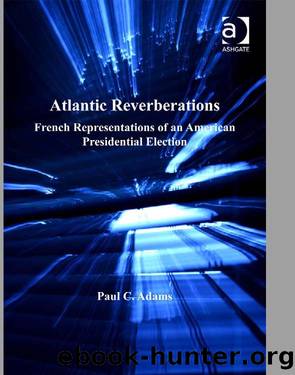Paul C. Adams by Atlantic Reverberations

Author:Atlantic Reverberations [Inconnu(e)]
Language: fra
Format: epub
Published: 2020-07-02T13:39:08.267000+00:00
* * *
Newspaper Reporting: Restraint and Balance
111
The blending of No Difference and Big Difference motifs had much to do with
the fact that French opinion leaders did not choose sides in a way that was easily
understood. If we want to come up with a simple prediction of their response all
we have to do is note that the French political spectrum is wider than that of the
US and shifted substantially to the left. âMiddle of the roadâ in France is therefore
equivalent to the Democratic position in the US while American âmiddle of the roadâ
corresponds to the position of the French Right. Because of this difference between
French and US political positions, the French socialists who dominate the left might
well dismiss the Democrats as scarcely any different than Republicans since both are
positioned to their right, while centrists in France might be expected to welcome the
Democrat with open arms. This was not the case. A Le Monde article of November
2 (Séquence France 2004, 7) characterized the attitude across Franceâs political
spectrum as âanyone but Bush.â The subtitle of this article explained ambiguously:
âIf they had to declare a position in the American presidential election, Tuesday the
2nd of November, French politicians on all sides would vote mainly for John Kerry.
Many of them nevertheless deplore the similarities between the Democratic candidate
and the incumbent.â No Difference and Big Difference are again clearly contending
here. The principal support for the No Difference position comes from Maurice
Leroy of the centrist UDF party who proclaimed that âthe difference between Kerry
and Bush is the thickness of cigarette paper.â Alain Krivine of the Trotskyite LCR
party concurred that âthe drama is that between these two there is no true choice for
society,â and a Green Party representative, Noël Mamère, admitted reluctantly that
he would feel âobligated to vote for Kerry even if dragging my feet.â Meanwhile,
several socialist politicians who were interviewed for the story expressed a strong
preference for Kerry: âIn Paris people often turn up their nose at Kerry,â lamented
Jack Lang, adding: âI would vote against Bush, but also for Kerry, and without a
second of hesitation.â His support is echoed by another socialist, Jean-Christophe
Jambadélis, who calls himself âOne hundred percent pro-Kerry.â Meanwhile Jean-
Marie Le Pen, the neo-fascist candidate who electrified Franceâs 2002 election and,
by frightening the Left, ultimately opened the door for Jacques Chirac (from the right
wing UMP party), stood almost alone in his preference for Bush. In short, Kerryâs
strongest supporters were not those with positions closest to his, but rather those of
the French left who were well left of Kerry himself. Meanwhile, the French center
and the Greens strove to maintain neutrality despite the similarity of their political
stance to that of the Democrat by promoting the âno differenceâ motif while the far
Right sided predictably with Bush. Newspapers looking to these political leaders for
ideological guidance would find a contradictory set of guideposts.
Comprehension of Kerryâs position improved throughout the duration of the
campaign. Taking a sample from mid-summer, an article in Le Figaro argued that
âAt 14 weeks from the presidential election, the image of the Democratic candidate
is all the more scrambled because
Download
This site does not store any files on its server. We only index and link to content provided by other sites. Please contact the content providers to delete copyright contents if any and email us, we'll remove relevant links or contents immediately.
| Anthropology | Archaeology |
| Philosophy | Politics & Government |
| Social Sciences | Sociology |
| Women's Studies |
Born to Run: by Christopher McDougall(7125)
The Leavers by Lisa Ko(6948)
iGen by Jean M. Twenge(5415)
Sapiens by Yuval Noah Harari(5370)
Spare by Prince Harry The Duke of Sussex(5196)
The Kite Runner by Khaled Hosseini(5178)
Machine Learning at Scale with H2O by Gregory Keys | David Whiting(4313)
Bullshit Jobs by David Graeber(4190)
Never by Ken Follett(3954)
Goodbye Paradise(3810)
Livewired by David Eagleman(3772)
Fairy Tale by Stephen King(3395)
A Dictionary of Sociology by Unknown(3085)
Harry Potter 4 - Harry Potter and The Goblet of Fire by J.K.Rowling(3073)
The Social Psychology of Inequality by Unknown(3029)
The Club by A.L. Brooks(2925)
Will by Will Smith(2919)
0041152001443424520 .pdf by Unknown(2845)
People of the Earth: An Introduction to World Prehistory by Dr. Brian Fagan & Nadia Durrani(2736)
